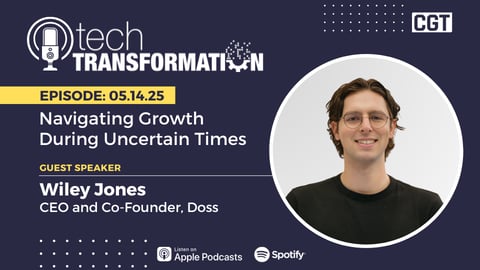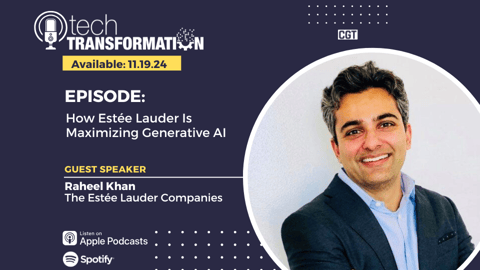Tech Transformation Podcast: Ball Corporation's Predrag Ozmo Talks Packaging, Sustainability, and Value Chain Mobilization
When it comes to packaging and sustainability, small alterations can add up to huge differences over time. Ball Corporation recognizes this power of incremental change and has built its strategy around driving meaningful impacts through specific, targeted action. In this episode, we’re talking with Predrag Ozmo, director of sustainability at Ball Corporation, about how the company collaborates with partners to mobilize value chains, drive decarbonization, and measure and improve the sustainability of aluminum packaging in a variety of forms.
Listen to learn:
• How Ball Corporation made sustainability central
• How innovations like lightweighting save costs for retailers
• Ball's plans to create a total circular solution for aluminum packaging
• Where they see the future of sustainability
• How they’re measuring success
• How they're advocating for decarbonization across the supply chain
• How sustainability is integrated into strategic planning, involving stakeholders and addressing emerging risks
• How they're exploring refill and reuse applications with partners
• What’s next for Ball Corporation
Subscribe
Excerpts
On aluminum: "The aluminum industry is what is known as a hard-to-abate sector because primary aluminum production is an energy-intensive process, largely reliant on fossil fuels. However, rigid aluminum packaging is a strong candidate to be one of the first industries to achieve net zero among the hard-to-abate sectors, because aluminum's intrinsic qualities enable full circularity.
Aluminum can be recycled again and again with minimal losses. It has a very high residual value and is easy, economical, and safe to handle in its end of life stage and has an excellent compaction rate which really helps in saving space and being more efficient. Moreover, recycling of aluminum only takes 5% of the energy needed to make new aluminum. That's a well-known fact in the aluminum world, but not everyone knows it. So by recycling, 95% of upstream emissions are completely eliminated from the overall carbon impact."
On collaboration: "We are very clear about that in every external communication, including our climate plan: industry alignment collaboration and systemic transformation are really essential to achieving our ambitious climate transition plan targets. Ball is a strong supporter of action-driven value chain mobilization around pioneering commitments to unlock the potential of emerging technologies needed for net zero.
There are a lot of technologies out there that support and have zero journey and we are strong supporters of all of them wherever we can. We're so pleased to have a number of great partnerships across our business working towards sustainability. Just recently, Ball made a long-term purchase agreement with Novelis for the supply of aluminum beverage can sheets which triggered an investment of over $2.5 billion by Novelis in the construction of two new rolling mills, underscoring the strong demand for high-recycle content beverage can sheds. The new plant expected to begin commissioning in 2025 will be the first fully integrated aluminum manufacturing plant built in the US in nearly 40 years."
On light weighting: "The retailers benefit mostly through our innovations. For example, let's say, lightweighting practices. Since the 1970s, beverage can weights have decreased by more than 40%. Today cans can be produced with a wall thickness of 0.097 millimeters, which is as thin as a human hand. So our global, yeah, that's really thin.
So our global portfolio of star cans is setting kind of a new benchmark there, compared to other beverage cans of the same size, the StarCan design reduces weight by up to 8%. Through lightweighting, retailers save costs in transportation, pellets, and warehouse space, as well as fitting more products onto the shelf, saving on costs to restock the popular beverage aisle whilst having enough stock out back to refill as needed. And lightweighting also saves money for retailers, but our use of recycled aluminum means retailers can boast sustainable sourcing of their products."
On external certification: "We also received something called Aluminum Stewardship Initiative certification for our beverage division and this year also for our aerosol division, meaning that our operations are now 100% ASI certified globally. Achieving this certification is a way for companies to show that they are compliant with increasingly stringent sustainability protocols. This means while we transition to fully recycled content, our use of raw materials is externally scrutinized against sustainability criteria. So, for instance, retailers can be assured that the products they sell are really sustainable. There is a clear, transparent third-party certification and very clear criteria on what it actually means."
On future action: "Embracing a global low-carbon economy driven by true real circularity demands a couple of things. It demands unity, creativity, passionate advocacy, and acknowledging that our climate transition plan represents just the initial strivings of all. We are unwavering in our belief that inaction poses the most significant risk. And we are very clear about that in the conclusion of our climate transition plan.
Our commitment really extends beyond the present plan. We anticipate that forthcoming versions to secure validation from the science-based targets initiative, devaluing the costs associated with each approach and level we identified in them. Embracing the evolving landscape, let's say, of climate science, we pledge to continuously, constantly refine our strategies while ensuring alignment with the latest advancements out there – technological or otherwise. In these times of uncertainty, leadership emerges as the paramount force, the pivotal force that shall determine the fate of the aluminum packaging industry of our society and ultimately the health of our planet."
Tech Transformation Videos
Looking for just a snapshot? Watch a segment of the interview and see more Tech Transformation episodes.







